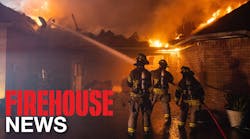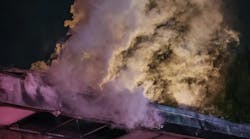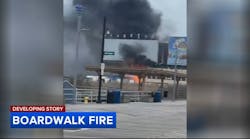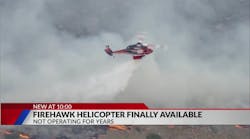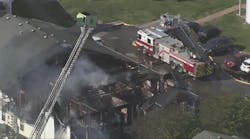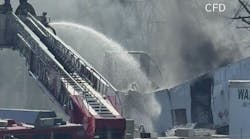If I hear one more person, either a leader or a follower, ask "What's in it for me?" I think I'll scream. How can you be a caring, sharing leader with an attitude like this? How can you get out in front and take chances, when your only concern is for yourself? Heck, we are in the lifesaving business. You do not do what we do to get rich, you do it to help people.
Before I launch into one of my famous tirades, let me pause to commend those among you who are still bound by the traditional way of caring for people. As I have stated on numerous occasions in many venues, the true leader should remember to live the leader's role as a servant of the troops. They work to serve the citizens of their communities, and lead their troops. They must balance this with their position within the political environment of the community wherein they serve.
They must also follow another critical element in the leadership equation. They should strive to live the motto of the U.S. Army Infantry School: "Follow Me!" This was one of the primary traits listed by the members of Harry's Gang during our survey work. Time and again, people wrote about their shining examples of good leaders in these terms:
- They would never ask you to do something they hadn't done themselves.
- They stood up for their people.
- They remembered how they were treated when they were firefighters and vowed not to do that to others.
- They remembered the good leaders they had followed and worked to emulate them.
- They would never pull the rug out from under you.
- You could always trust them to keep their word.
In other words, they were always thinking of others, not themselves.
These are some really fine compliments, but are they words that can be uttered about you? I have worked with far too many people who could have had streets named after them. You know the type: One Way. And guess which way the arrow is pointed.
For a change, I am not talking about chiefs and politicians. I am talking about officers of all ranks who place their own good before the general good of the people they lead. A couple of examples spring quickly to mind.
I can remember a captain who always felt that reloading hose was beneath his dignity as a gentleman. Now I am sure that there are a number of departments that go out of their way to make sure that captain is a dignified and respected position. And there are many departments that consider a captain to be too important of a supervisor to load hose.
That is just not my view of things. To me, a captain has always been a working foreman (or foreperson nowadays). Anyway, this captain to whom I am referring would always plunk his butt down in the cab of his pumper while the troops struggled to reload the hose. If the full crew of a driver and three firefighters was there, maybe the captain could monitor the operation, but this guy would do his disappearing act even when the crew had shrunken down to a driver and one firefighter. This is sure not a good way to create loyalty among the troops. The funny part of this is that I know where this man worked before being promoted, and his old captain always helped out with the chores.
How important is loading hose with the troops? It is not the activity itself undertaken so much as it is the willingness of the leader to share in the task at hand. The same thing holds true on the fireground.
I can remember a battalion chief who took great pride in the fact that he never wore self-contained breathing apparatus (SCBA). He mentioned this to me just after I came stumbling out of a burning church, covered with soot and soaking wet, after working with a very aggressive group of engine companies to halt the spread of the fire. He was great for shouting encouragement from the safety of the street. He was also famous for calling the shots on a cold winter's night from the heated front seat of his chief's car.
The only time this guy ever led from the front was when it came time to catch an ambulance for the hospital - or to hit the chow line. I figured that if I did my job exactly opposite from him, I would succeed. I was right again.
Another burr that periodically pops up under my saddle involves officers who spend their entire lives doing paperwork. They will call a drill or a cleanup detail, show their face and then duck into the office under the guise of doing paperwork. While the troops are slaving away on a drafty apparatus floor getting wet and dirty, these home-office commandos hide behind the doors of their computer-laden palaces.
How can you supervise people you cannot see? How do you even know if the work is being done if you are hidden away in a warm and comfortable office? Even if you don't want to lower yourself to swab toilets with the peasants, why not hang around and offer a bit of support and encouragement to the working class.
There is a time and a place for paperwork. I realize that it is a necessary evil that comes with the burden of command. But don't duck out on the dirty details and leave the troops on their own. Be sure to share the good and the bad with your troops.
Conversely, I remember a deputy chief who let each of his battalion chiefs take charge of their battalion districts. He encouraged his chiefs to make decisions and try innovative approaches. He allowed them to try. When they failed, he helped them learn from their mistakes. He took a great deal of grief from above, but he stood behind his guys. And when the chiefs succeeded, as they did with growing frequency under his tutelage, he allowed them to bask in the warm glow of their success. He did not rush in and take credit for their good works. However, the troops all knew that he was at the root of their success. People went out of their way to transfer to his shift, because they knew that the work environment was stimulating and secure.
What people see a leader do stimulates them to act. They can emulate them or reject them. People who act in such a way that they are labeled as poor leaders are usually rejected by people who see them for the frauds that they are. However, if they are a negative example and are emulated by their followers, they will then spread the seed of bad leadership. That is why it is so critical for any of us in positions of leadership to set a positive example.
More than that, the ways in which we train our followers set the tone for the future leadership pool in our organization. A great leader can bring about several generations of effective leaders. However, one bad apple can beget a series of future bad apples that can hamstring their department's ability to be successful in the future. Many fire department are experiencing leadership problems owing to a series of poor leaders who followed one upon the other.
There is also the matter of the inside versus the outside search for fresh departmental leadership. Many communities go through the window dressing of a wide-area search to disguise the fact that they intend to crown a local prince as the new king. A number of professional associates have gone through the sweat and strain of traveling for interviews only to see the insider get the job anyway. If a fresh style of leadership is deemed necessary, it should be done in a fair and impartial manner through the use of a third-party recruiting firm.
I fear that many communities are almost at the point of no return when it comes to changing how they operate. The insidious growth of political influence has so thoroughly permeated many municipalities that the fire departments in those places have been reduced to job services for the favored few. I see instances of this every week on the Internet.
How did the fire service come to this point? This came about through the magic of misguided leaders who never did have a good example to follow during their growth and maturation as first-line and mid-level managers. Can people change? There is always hope. That is why I keep pounding the keys on my weary computer.
Maybe someone, somewhere will rise up, shake off the dust of past bad leadership and take an enlightened approach to the 21st century. They will then become true servants to the troops and leaders in the community. If and when this happens, I hope that they might possibly remember that a tired old battalion chief from the city of Newark stood up on more than one occasion and yelled, "Follow me!"
Harry R. Carter, Ph.D., MIFireE, a Firehouse® contributing editor, is a municipal fire protection consultant based in Adelphia, NJ. He is also an associate professor at Mercer County Community College and a past chief and active life member of the Adelphia Fire Company. Dr. Carter retired from the Newark Fire Department in 1999 as a battalion commander. He also served as chief of training and commander of the Hazardous Materials Response Team. Dr. Carter is a Member of the Institution of Fire Engineers of Great Britain (MIFireE). He may be contacted through his website at [email protected].